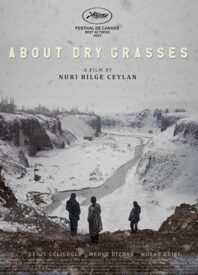
About Dry Grasses is Nuri Bilge Ceylan’s ninth feature, and the second film that I’ve seen from his filmography. His previous feature, The Wild Pear Tree, was a flawed dramedy, and this time around, he’s returning to full blown drama. And he does so by making some interesting choices, especially with what plot point does and doesn’t take the foreground. For his a-plot, he follows two thirtysomething teachers in wintry Anatolia, Samet (Deniz Celiloğlu) and Kenan (Musab Ekici), who take on a third teacher friend, Nuray (Merve Dizdar). Samet sets up Kenan with Nuray, but the three end up becoming a travel group despite each other’s romantic feelings. It’s strange to make that the a-plot, in a good way, because the b-plot seems traditionally juicier. A student, Sevim (Ece Bağcı) accuses Samet of inappropriate behaviour. He is innocent, although he becomes more hostile to her as the film progresses.
I’m probably just a great mark for Ceylan’s films, or slow cinema in general, but this is a good example of the genre. Its long and quiet atmosphere just makes its occassional bursts more explosive, and its conversations more meaningful. It lets its viewers absorb its meaning, even if it is one that Turkish directors explore frequently in their films. One of the themes in About Dry Grasses, obviously, is that belonging is as much about others’ perception. Sometimes, one’s own perception matters less. Ceylan touches on this in Wild. That film takes place in a town that sells its Greek history despite problems within doing so. Here, characters see the two teachers as locals even if they are not. Nuray asks to take a picture of Kenan the same way Samet takes pictures of the locals for his classes.
About Dry Grasses overcomes its share of suspending disbelief, and this is true even for a ‘low stakes’ drama. One of its key scenes involve a political conversation between Samet and Nuray which, you can’t make me have a political conversation anymore. Or maybe that’s not true, as the film explores where these characters can be comfortable being political. While Samet cyberstalks Nuray, he sees a post indicating her political beliefs, and she’s able to speak on them publicly. Most people, even people in the West with ‘free speech,’ don’t have the same comfort level as Nuray shows here. Nuray asks Samet to clarify what he means about hope, which brings it back to how we all have similar ideals. That, or that we want to think we have them which, either eway, this film gives us a lot to ponder.
- Rated: All
- Genre: Drama
- Release Date: 3/1/2024
- Directed by: Nuri Bilge Ceylan
- Starring: Deniz Celiloğlu, Ece Bağcı, Merve Dizdar, Musab Ekici
- Produced by: Bettina Ricklefs, Janine Jackowski, Maren Ade
- Written by: Ebru Ceylan, Nuri Bilge Ceylan
- Studio: BR, NBC Film, Playtime, TRT Sinema

